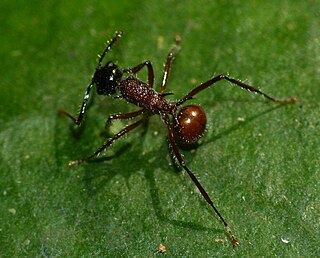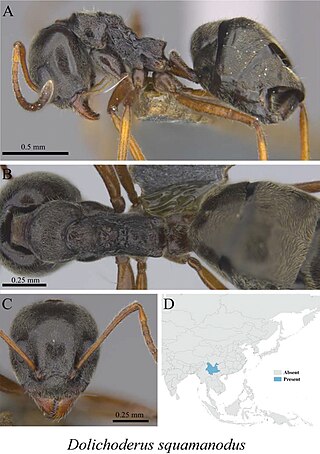
Charles Thomas Bingham was an Irish military officer and entomologist.

Dolichoderus is a genus of ants found worldwide.

Polyrhachis gracilior is a species of ant found in the southwest and northeast India. It is one of the few ants that build arboreal nests made of leaves stitched together using silk produced by their larvae.

Pseudoponera is a small genus of ponerine ants. The genus was described by Emery in 1900.
Dolichoderus angusticornis is a species of ant in the genus Dolichoderus. Described by John S. Clark in 1930, the species is endemic to Australia, found in dry scrub heath in Western Australia and South Australia. Workers are diurnal and foraging during the day and at night.
Dolichoderus australis is a species of ant in the genus Dolichoderus. Described by André in 1896, the species is endemic to Australia, where it is commonly found in wet forested areas in the southern regions of the country. It is particularly known for its unique behaviour and role in ecology.
Dolichoderus brevicornis is a species of ant in the genus Dolichoderus. Described by Dlussky in 2002, remains of the species were discovered in the Baltic Amber.

Dolichoderus cornutus is an extinct species of Eocene ant in the genus Dolichoderus. Described by Mayr in 1868, the fossils were discovered in the Baltic amber, where a fossilised worker ant was only described, and it is presumed these ants existed at least 40 million years ago.
Dolichoderus crawleyi is a species of ant in the genus Dolichoderus. Described by Horace Donisthorpe in 1917, the species is endemic to Singapore.
Dolichoderus elegans is an extinct species of Eocene ant in the genus Dolichoderus. Described by William Morton Wheeler in 1915, the fossilised remains of the species were found in the Baltic amber.

Dolichoderus feae is a species of ant in the genus Dolichoderus. Described by Carlo Emery in 1889, it is endemic to multiple countries, notably China, India, Myanmar (Burma) and Thailand.
Dolichoderus ferrugineus is a species of ant in the genus Dolichoderus. Described by Auguste-Henri Forel in 1903, the species is endemic to Bolivia and Brazil.

Dolichoderus kinabaluensis is a species of ant in the genus Dolichoderus. Described by Dill in 2002, the species is endemic to Borneo.
Dolichoderus spurius is a species of ant in the genus Dolichoderus. Described by Auguste-Henri Forel in 1903, the species is endemic to South America.

Dolichoderus squamanodus is a species of ant in the genus Dolichoderus. Described by Xu in 2001, the species is endemic to China.

Dolichoderus sulcaticeps is a species of ant in the genus Dolichoderus. Described by Mayr in 1870, the species is endemic to Borneo, Indonesia, Malaysia, Thailand and Vietnam.

Dolichoderus taschenbergi is a species of ant in the genus Dolichoderus. Described by Mayr in 1866, the species is endemic to Canada and the United States.

Dolichoderus vectensis is an extinct species of the Oligocene ant in the genus Dolichoderus. Described by Horace Donisthorpe in 1920, the fossils of the species were found in the United Kingdom.
Dolichoderus pinguis is an extinct species of formicid in the ant subfamily Dolichoderinae known from a fossil found in Asia. The species is one of a number in the genus described from fossils.










